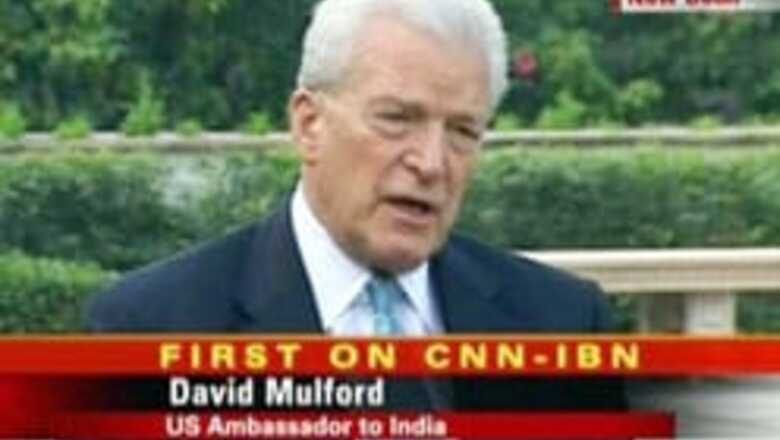
views
As the news came in of the Senate clearing the bill that will enable the US Government to go through with the Indo-US civilian nuclear deal, CNN-IBN's Deputy Foreign Editor Suhasini Haidar caught up with David Mulford, US Ambassador to India, to find out what the latest development means.
Suhasini Haidar: Ambassador, the Senate has passed this particular part of the legislation by, what we call, a thumping majority. What are your reactions to that? And also, was this the last of the major obstacles in the road ahead to the deal?
David Mulford: Well, first we have to recognise what the Senate action is, which is perhaps a long sweep of the US-India relations. It is certainly a historic day and perhaps the most important day for the US-India relations.
Suhasini Haidar: In terms of what was actually passed, there were no killer amendments in that. However, the Indian Government has already expressed its concerns over some of the provisions in the Senate version of the bill itself, specifically 106, 107, 108, which have to deal with annual certification, to deal with restrictions on nuclear trade of any sort. The Indian Prime Minister did speak to US President (George) Bush, making it very clear that he hopes Indian concerns would be addressed. Now, those concerns still remain.
David Mulford: Well, the bill was passed overwhelmingly. The so-called killer amendments were defeated. And the other provisions of the bill and the House bill fall within the parameters of the agreement between the two countries. We know there are certain provisions regarding reporting and other things that are sensitive.
But these are matters that a conference has been convened to deal with and the administration remains committed to keeping this legislation within the spirit and letter of the agreement between the two countries.
Suhasini Haidar: Now, when the House of Representatives and the Senate get together to actually conference and put the deal together, are you hoping to make some of these non-binding clauses? How do you hope to get around them?
David Mulford: When the conference convenes, we will discuss the issues of difference between the two bills. And it will also discuss matters that are known to be sensitive to the Indian Government. And an effort will be made by the Members of the Congress from both Houses to rationalise the bills into a single bill that can be sent to the President for signature. And I have no doubts that the administration will continue, as it has done till now, to push to make sure that the bill conforms to the agreement between the two countries.
Suhasini Haidar: When you mention the sensitive clauses, the Senate actually rejected an amendment on Iran, which wanted to ask the Indian Government to stop all military ties with Iran.
However, there is one amendment in that, which does ask the US President to ensure that India will make sure that Iran will comply with international laws on nuclear trade. Are you sure that is not going to be a sensitive amendment?
David Mulford: There are no killer amendments, I have already made that clear. There are some issues that I said are sensitive. Some of those having to do with reporting requirements. I think it's important for people to understand that within our system of government, we have certain reporting requirements associated with all legislations, the duty for which falls upon the US Government, in this case, not on the Indian Government.
And if there are going to be reporting requirements of one kind or another, those will be the duty and responsibility of the United States just as the structure of Question Time in your Parliament, which is a matter for your Parliament (to deal with). So, these are non-binding matters, they have to do with reporting certain information to keep the Congress up in terms of information about what's going on. There is nothing sinister about these things.
Suhasini Haidar: Finally, the bill has made it this far in this particular House, in this particular Senate. But from January, you will see another complexion to the Congress. Will the Democratic win change what we are going to see happen to the deal in the next few months?
David Mulford: The answer to that is no and you can already see that the answer is no. Because, this bill has been supported 85 to 12, which itself is a huge bipartisan majority that supports US-India relations, and this bill in particular, just as there was in the House.
Suhasini Haidar: Are you feeling relieved this morning, Ambassador?
David Mulford: I'm feeling absolutely great. It's a great day for US-India relationship.



















Comments
0 comment